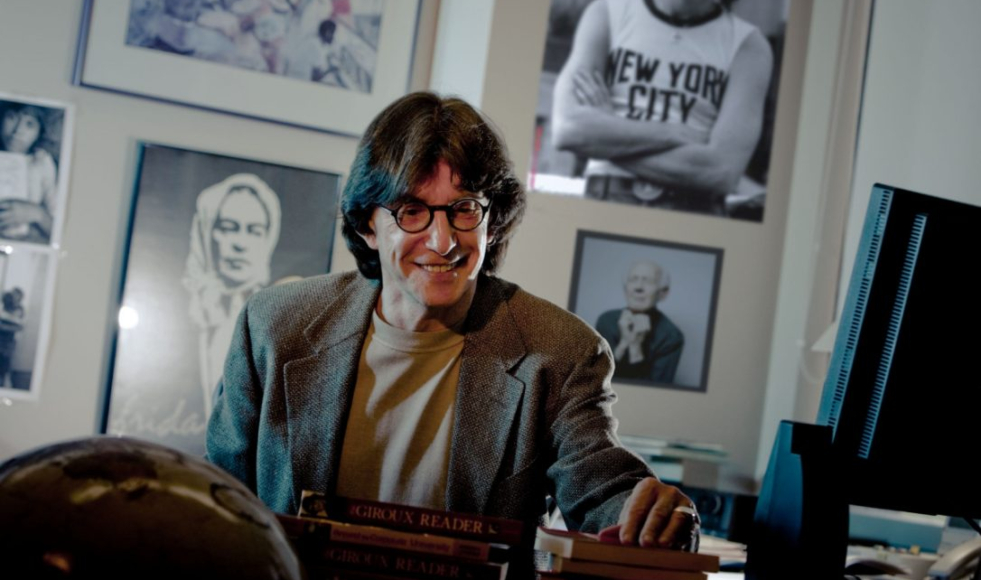“If your work doesn’t reach into the future, what’s the point?” — Q & A with Henry Giroux

At 80 years old and with more than 80 books to his name, Henry Giroux definitely isn’t looking back. In fact, he’s more focused on the future than ever. (McMaster University photo)
BY Sara Laux, Faculty of Humanities
November 5, 2024
“I want to see students who embrace their own sense of possibility — not to follow my path, but to look within and declare, ‘I’m here. I have the tools, and I can shape my world.’ That, to me, is the ultimate purpose of education: to spark the courage and conviction for young people and others to make a difference.”
— Professor Henry Giroux
Henry Giroux has been a professor in McMaster’s department of English & Cultural Studies for 20 years, and has held the McMaster University Chair for Scholarship in the Public Interest for the past decade.
At 80 years old, Giroux has published more than 80 books, has honorary degrees from six universities around the world, and maintains an active teaching schedule — these days, mostly with graduate students.
He’s a frequent contributor to print and online outlets and scholarly journals, and is regularly interviewed by local, national and international media for his perspective on education, American politics and the dangers of neo-fascism.
In this whirlwind of activity, the Faculty of Humanities caught up with him to ask about his past, present and future.
Below is an excerpt from that conversation. Click here for the the full interview.
Was there a point at which you made the transition from being an academic and talking about critical pedagogy to being that out-in-the-world activist? Or was that always the way you did things?
I’ve never treated my work solely as a career — it was always more of a vocation. I’ve always considered myself both an academic and a public intellectual, and that really began when I was a high school teacher [in Barrington, Rhode Island] for six years, during the Vietnam war.
At that time, I was living … next to Brown University, and I used to go to lectures there. Honestly, many of them I didn’t understand — this was an academic world alien to my own working-class background.
One day, Stanley Aronowitz came to Brown and gave a public talk. He had no notes and talked to the audience with a sense of passion, critique, and relevance, combining both rigour and accessibility.
That was a performance I had never seen before — he was a working-class public intellectual who was crossing boundaries and refusing to talk in the kind of stifling jargon often endemic to academic talks.
I was sold. That was a moment that changed my life — working-class intellectuals, talking about important issues and doing it with ease in a language in which you could actually recognize yourself, that was moving and passionate. It was like a melody, like the blues unfolding in front of you.
You’re a pioneer in the field of critical pedagogy, and you’ve worked in universities for many years. What role do you see universities playing in helping to fix the world?
This question strikes at the very heart of what universities should aspire to be in today’s world. In an era overshadowed by climate collapse, nuclear threats, the repression of dissent, the censoring of history, and the erosion of democratic principles, higher education must not remain in isolation from these existential crises. They should be bastions of engagement, not withdrawal — a true public good committed not only to preserving democracy but to enabling and invigorating it.
The university’s mission must reach beyond vocational training or corporate modes of governance. It should be a place where learning and justice unite, fostering citizens of critical thought, moral agency, and social responsibility — a bridge to deepen democracy, not just to serve the economy.
To counteract the forces of ignorance, universities should stand as pillars of enlightenment. They must offer the intellectual and ethical support that democracy requires — not only as institutions of learning but as symbols of hope and possibility for a just and compassionate world.
Remember, there is no democracy without informed citizens.
Can you talk a little about your work with students?
I want students to be moral witnesses — conscientious beings who see beyond themselves and understand the need to fight for something larger-strive to be informed and critical citizens.
Whether they lean left or right is immaterial; what matters is that they engage the world with integrity.
In my classes, writing and dialogue are valued. I show students that rigor and accessibility aren’t contradictory; they’re essentials. Each student is a public intellectual here, finding their voice and agency through conversation and exchange.
The kind of speaking out that you do can be dangerous, in many different ways. Do you ever feel the danger of what you do?
To be informed, critical, and willing to fight for a better world demands immense courage. It requires a refusal to be silenced by institutional comforts or pressures. Speaking out today is, indeed, dangerous. In times like these, as Hannah Arendt noted, thinking itself has become a risk.
Authoritarian figures in the U.S., Italy, Hungary, and India, among other countries, embrace the language of dehumanization and even extermination. My role as an academic is to confront these threats, knowing full well the cost of civic courage. Taking risks is essential — because if we don’t, we risk complicity in the very forces that will haunt us. Learning from history is crucial in order to recognize the abuse of power and how to confront it.
Even at this late stage in my life you have to learn to take a risk, because if you don’t, you’re going to become complicit in something that overall is going to keep you up at night.
Of course, there are always consequences. This is not a free ride. Civic courage comes at a price.


